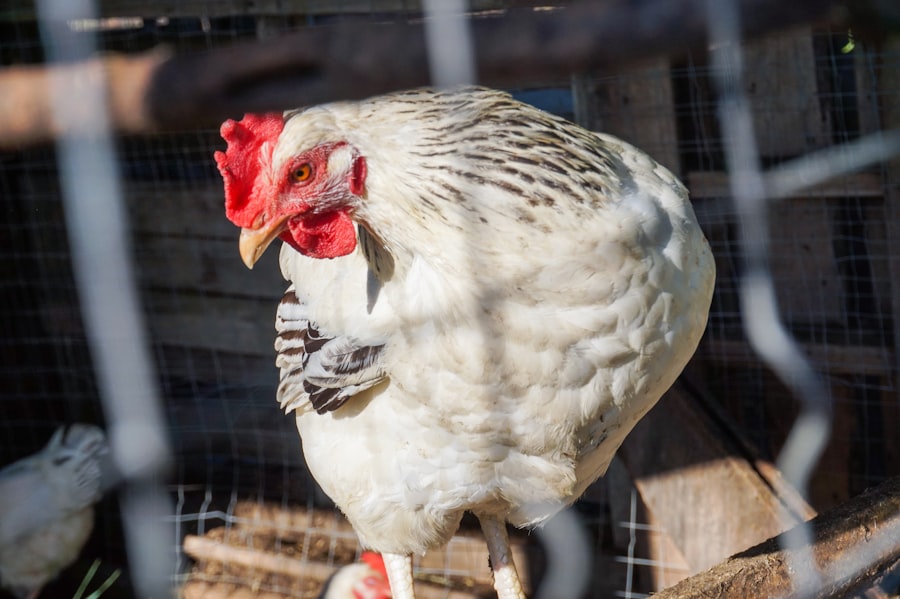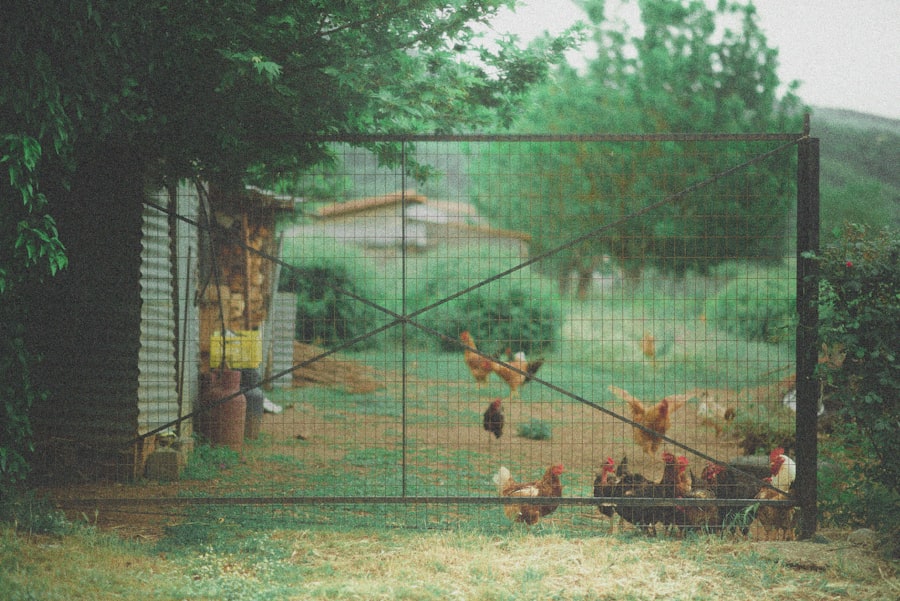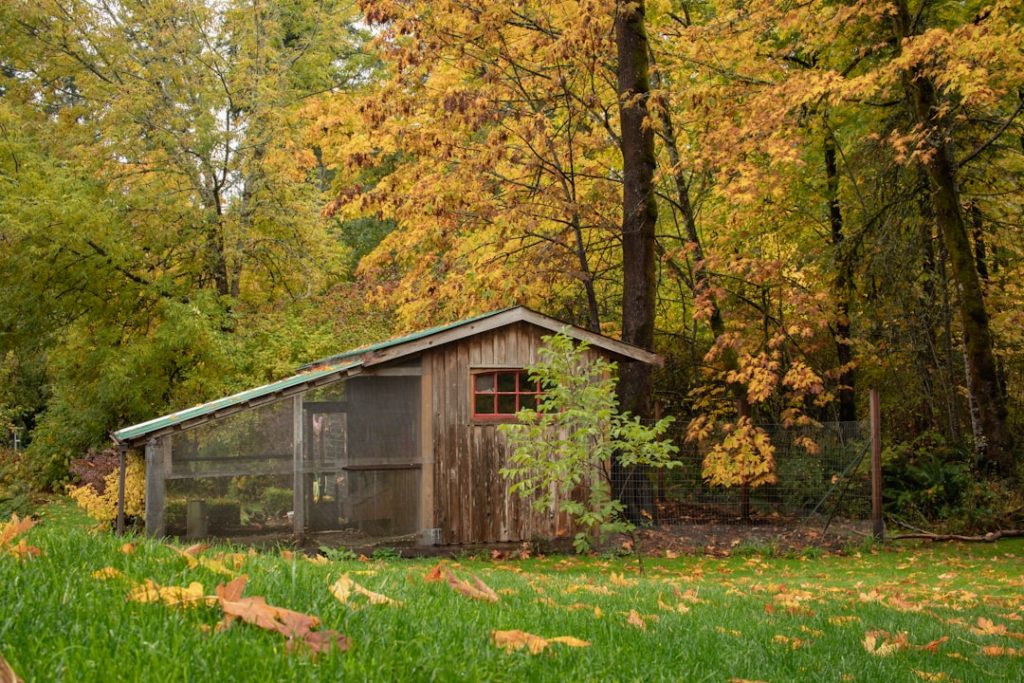Chickens face numerous predators, ranging from small to large animals. Common threats include foxes, raccoons, coyotes, dogs, cats, hawks, owls, and snakes. Each predator presents unique challenges, requiring chicken owners to understand their behaviors and habits for effective flock protection.
Foxes are known for their cunning and agility, often digging under fences or climbing obstacles to reach chickens. Raccoons are skilled climbers and can manipulate latches and doors, necessitating secure coop locks. Coyotes, known for speed and stealth, can jump fences and are attracted to chicken coop sounds and smells.
Stray or feral dogs and cats may view chickens as easy prey due to their natural hunting instincts. Birds of prey, such as hawks and owls, pose a threat to free-range chickens, capable of swooping down and carrying them off. Snakes endanger eggs and young chicks by entering coops and nesting areas undetected.
To safeguard chickens, owners must recognize signs of predator activity and implement proactive security measures for both coops and free-range areas. A thorough understanding of predator behavior enables chicken owners to better protect their flocks from potential harm.
Table of Contents
- 1 Securing the coop: Tips for building a predator-proof chicken coop
- 2 Protecting free-range chickens: Strategies for keeping chickens safe while they roam
- 3 Nighttime precautions: How to keep chickens safe from nocturnal predators
- 4 Using deterrents: Natural and humane ways to discourage predators from targeting chickens
- 5 Supervision and training: Techniques for keeping an eye on your chickens and teaching them to stay safe
- 6 Emergency response: What to do if a predator attacks your chickens and how to prevent future incidents
- 7 FAQs
Key Takeaways
- Common predators of chickens include foxes, raccoons, hawks, and snakes
- Building a predator-proof chicken coop involves using sturdy materials and secure latches
- Keeping free-range chickens safe can be achieved through the use of fencing and supervision
- Nighttime precautions for chickens include locking them in a secure coop and using motion-activated lights
- Natural deterrents for predators include planting thorny bushes and using predator urine
- Supervising and training chickens involves regularly checking on them and teaching them to come to a designated area for food and shelter
- In the event of a predator attack, it’s important to remove injured chickens, secure the coop, and reinforce defenses to prevent future incidents
Securing the coop: Tips for building a predator-proof chicken coop
Choosing the Right Materials
When building a chicken coop, it’s crucial to invest in high-quality materials. This includes using sturdy wire mesh with small openings to prevent predators from reaching through or squeezing in between the wires. Additionally, all doors and windows should be fitted with secure locks and latches to prevent raccoons and other animals from breaking in.
Design and Layout Considerations
The design and layout of the coop are also critical in preventing predator attacks. Coops should be elevated off the ground to prevent snakes from slithering inside, and nesting boxes should be designed with secure lids to prevent raccoons and other animals from stealing eggs or harming brooding hens. Furthermore, it’s essential to keep the coop clean and free of food scraps and debris, as these can attract predators.
Regular Maintenance and Inspection
Finally, it’s vital for chicken owners to regularly inspect their coop for any signs of wear or damage, and to make repairs as needed. By taking these proactive measures, chicken owners can create a safe and secure environment for their flock, protecting them from the threat of predators.
Protecting free-range chickens: Strategies for keeping chickens safe while they roam

Allowing chickens to free-range can provide numerous benefits, including access to fresh grass and insects, as well as opportunities for exercise and natural behaviors. However, free-ranging chickens also face increased risks from predators, making it essential for chicken owners to implement strategies for keeping their flock safe while they roam. One effective strategy for protecting free-range chickens is to use livestock guardian animals such as dogs or geese.
These animals can help deter predators and alert chicken owners to potential threats. Dogs in particular can be trained to patrol the perimeter of the free-range area and chase off predators, providing an added layer of protection for the flock. Another important consideration when protecting free-range chickens is the layout of the free-range area itself.
Chicken owners should aim to create a secure perimeter using fencing or natural barriers such as hedges or shrubs. Additionally, it’s important to provide plenty of hiding spots and shelters within the free-range area where chickens can seek refuge if they sense danger. In addition to these strategies, it’s important for chicken owners to be vigilant and observant while their chickens are free-ranging.
Regularly scanning the area for signs of predator activity and keeping an eye on the behavior of the flock can help chicken owners identify potential threats before they escalate. By implementing these strategies, chicken owners can provide their flock with the freedom to roam while minimizing the risks posed by predators.
Nighttime precautions: How to keep chickens safe from nocturnal predators
Nocturnal predators pose a significant threat to chickens, as they are often more difficult to detect and deter than daytime predators. In order to keep chickens safe from nocturnal threats such as foxes, raccoons, owls, and snakes, it’s important for chicken owners to take specific precautions at night. One of the most effective ways to protect chickens from nocturnal predators is to ensure that the coop is securely locked up at night.
This includes closing all doors and windows and securing them with strong locks and latches. Additionally, it’s important to check for any gaps or openings in the coop that could allow predators to gain access, and to make any necessary repairs. Another important consideration when protecting chickens from nocturnal predators is providing adequate lighting around the coop.
Motion-activated lights can help deter predators by startling them with sudden bursts of light, making them think twice before approaching the coop. Additionally, keeping a radio or other noise-making device near the coop can help deter nocturnal predators by creating a sense of activity and alertness. Finally, it’s important for chicken owners to regularly inspect the perimeter of the coop for signs of nocturnal predator activity, such as tracks or droppings.
By being vigilant and proactive in protecting their flock at night, chicken owners can minimize the risks posed by nocturnal predators.
Using deterrents: Natural and humane ways to discourage predators from targeting chickens
In addition to securing the coop and free-range areas, there are several natural and humane deterrents that chicken owners can use to discourage predators from targeting their flock. One effective deterrent is the use of scent-based repellents such as predator urine or essential oils. These scents can help mask the smell of chickens and deter predators from approaching the coop or free-range area.
Additionally, planting strong-smelling herbs such as lavender or mint around the perimeter of the coop can help deter predators with their strong odors. Another natural deterrent that can be effective in keeping predators at bay is the use of visual deterrents such as scarecrows or reflective objects. These visual deterrents can startle predators and make them think twice before approaching the coop or free-range area.
Additionally, hanging shiny objects such as aluminum foil strips or CDs around the perimeter of the coop can create flashes of light that may deter predators. Finally, another natural deterrent that can be effective in protecting chickens from predators is the use of sound-based repellents. This can include playing recordings of predator calls or other loud noises near the coop or free-range area.
These sounds can help create a sense of danger for potential predators, encouraging them to stay away. By using these natural deterrents in combination with other protective measures, chicken owners can create an environment that is less attractive to predators, reducing the risk of attacks on their flock.
Supervision and training: Techniques for keeping an eye on your chickens and teaching them to stay safe

Supervision: The Key to Identifying Potential Threats
Supervision and training are crucial aspects of keeping chickens safe from predators. By being vigilant and observant while their chickens are free-ranging, chicken owners can identify potential threats before they escalate.
Effective Supervision Techniques
One effective technique for supervising free-range chickens is using a designated “chicken watcher” who can keep an eye on the flock while they roam. This person can scan the area for signs of predator activity and keep track of the behavior of the flock, intervening if necessary to protect them from potential threats.
Training Chickens to Recognize Danger Signals
Another important aspect of supervision is training chickens to recognize danger signals and seek refuge when necessary. This can include using verbal cues or signals such as clapping or shouting to alert the flock to potential danger. Additionally, providing plenty of hiding spots and shelters within the free-range area where chickens can seek refuge if they sense danger is essential.
Implementing Supervision and Training Techniques
By implementing these techniques for supervision and training, chicken owners can provide their flock with an added layer of protection against potential predators.
Emergency response: What to do if a predator attacks your chickens and how to prevent future incidents
In the unfortunate event that a predator attacks your chickens, it’s important to have an emergency response plan in place to minimize harm to the flock and prevent future incidents. If a predator attacks your chickens, it’s important to act quickly to intervene and protect the flock. This may involve chasing off the predator using loud noises or physical deterrents such as water hoses or air horns.
Additionally, it’s important to assess any injuries sustained by the flock and provide immediate medical attention if necessary. After an attack has occurred, it’s important for chicken owners to assess their coop and free-range areas for any vulnerabilities that may have allowed the predator access. Making any necessary repairs or adjustments to secure these areas can help prevent future incidents.
Additionally, it’s important for chicken owners to report any predator attacks to local wildlife authorities in order to help track patterns of predator activity in the area. By taking these proactive measures, chicken owners can minimize the risks posed by predators and provide their flock with a safe and secure environment. In conclusion, protecting chickens from predators requires a combination of proactive measures including securing coops, implementing deterrents, supervising free-range activities, training chickens on safety measures, having an emergency response plan in place in case of an attack among others.
By understanding common predators’ behavior patterns such as foxes’ agility or raccoons’ climbing skills among others; one is better equipped at identifying potential threats before they escalate. It is also crucial that one invests in high-quality materials when building a chicken coop such as sturdy wire mesh with small openings; this will prevent predators from reaching through or squeezing in between wires among other measures mentioned above.
If you’re looking for tips on how to keep your chickens safe from predators, check out this article on PoultryWizard. It provides valuable information on how to design and maintain a secure chicken coop to protect your flock from potential threats.
FAQs
What are common predators of chickens?
Common predators of chickens include foxes, raccoons, coyotes, dogs, cats, hawks, owls, and snakes.
How can I keep my chickens safe from predators?
To keep chickens safe from predators, you can use secure fencing, predator-proof coops and runs, motion-activated lights or sound devices, and keeping the area around the coop clear of hiding spots for predators.
What should I do if I suspect a predator is targeting my chickens?
If you suspect a predator is targeting your chickens, it’s important to take immediate action to secure the coop and run, and consider setting up traps or contacting a professional wildlife removal service.
Are there any natural deterrents for predators?
Some natural deterrents for predators include using guard animals such as dogs or geese, planting thorny bushes or shrubs around the coop, and using strong-smelling herbs or plants to repel predators.
What should I do if a predator attacks my chickens?
If a predator attacks your chickens, it’s important to assess the situation and provide immediate medical attention to any injured birds. You should also reinforce the security of the coop and run to prevent further attacks.
Meet Walter, the feathered-friend fanatic of Florida! Nestled in the sunshine state, Walter struts through life with his feathered companions, clucking his way to happiness. With a coop that’s fancier than a five-star hotel, he’s the Don Juan of the chicken world. When he’s not teaching his hens to do the cha-cha, you’ll find him in a heated debate with his prized rooster, Sir Clucks-a-Lot. Walter’s poultry passion is no yolk; he’s the sunny-side-up guy you never knew you needed in your flock of friends!







